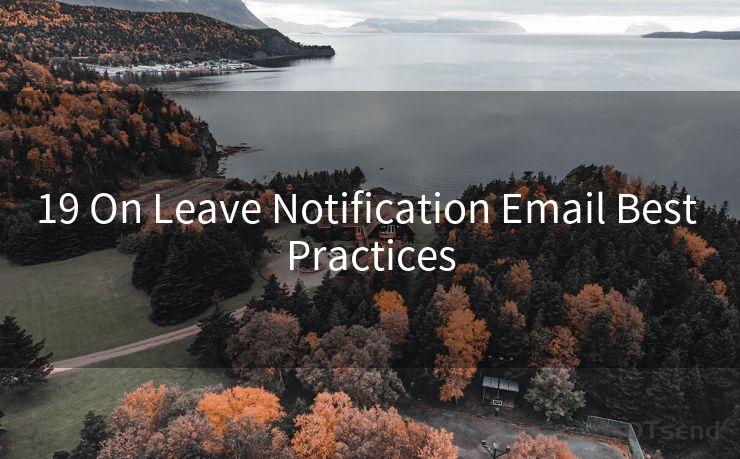19 On Leave Notification Email Best Practices




When it comes to taking a leave from work, whether it's for personal reasons, vacation, or any other cause, it's essential to notify your team or organization properly. An on-leave notification email is a professional way to inform your colleagues about your absence. Here are 19 best practices for writing an effective on-leave notification email.
1. Clear Subject Line
Start with a clear and concise subject line that summarizes the purpose of your email, such as "On Leave Notification - [Your Name] - [Dates of Leave]".
2. Formal Greeting
Begin your email with a formal greeting, addressing your recipients appropriately. For example, "Dear Team," or "Dear Colleagues," depending on your audience.
3. State the Purpose
Immediately after the greeting, clearly state the purpose of your email. For instance, "I am writing to inform you that I will be taking a leave of absence from [start date] to [end date]."
4. Explain the Reason
Provide a brief explanation of the reason for your leave, whether it's for personal reasons, vacation, medical leave, or any other valid cause. Keep it professional and to the point.
5. Work Arrangements
Detail any work arrangements you have made to ensure that your responsibilities are covered during your absence. This might include delegating tasks, setting up autoresponders, or providing access to necessary files and information.
6. Emergency Contact
If possible, provide an emergency contact number or email address where you can be reached in case of urgent matters.
7. Appreciation
Express your appreciation for your team's understanding and support during your leave.
8. Closing
End your email with a professional closing, such as "Sincerely," or "Best regards," followed by your name.
9. Proofread and Edit
Before sending, make sure to proofread and edit your email for clarity and professionalism.
10. Send in a Timely Manner

Ensure you send the notification email in a timely manner, allowing enough time for your team to adjust and prepare for your absence.
11. Use a Professional Tone
Maintain a professional tone throughout your email, avoiding colloquial or informal language.
12. Keep It Short and Sweet
Avoid lengthy explanations and stick to the essentials. Your team members are busy and appreciate brevity.
13. Consider Privacy
If your leave is due to a sensitive or personal matter, be mindful of sharing too much information.
14. Use Templates If Available
If your organization provides templates for leave notifications, consider using them as a starting point to ensure you cover all necessary information.
15. Follow Company Policies
Make sure your email aligns with your company's policies and procedures regarding leave notifications.
16. CC Relevant Parties
If there are specific individuals or departments that need to be aware of your leave, make sure to include them in the email.
17. Avoid Overly Personal Details
While it's important to explain the reason for your leave, avoid sharing overly personal or private details.
🔔🔔🔔
【AOTsend Email API】:AOTsend is a Managed Email Service for sending transactional emails. Support Email Types: reminders, authentication, confirmations, notifications, verification codes, invoices, password resets, account activations, billing statements, two-factor authentication (2FA), and one-time passwords (OTP) emails, etc. $0.28 per 1000 Emails. 99% Delivery, 98% Inbox Rate.
You might be interested in:
Why did we start the AOTsend project, Brand Story?
What is a Managed Email API, How it Works?
Best 25+ Email Marketing Platforms (Authority,Keywords&Traffic Comparison)
Best 24+ Email Marketing Service (Price, Pros&Cons Comparison)
Email APIs vs SMTP: How they Works, Any Difference?
18. Test Email Delivery
Before sending the final email, consider sending a test email to yourself to check for formatting, links, and readability.
19. Follow Up If Necessary
If you don't receive any responses or acknowledgments, consider sending a follow-up email to confirm receipt of your notification.
By following these best practices, you can ensure that your on-leave notification email is professional, informative, and considerate of your colleagues' time. Remember, communication is key to maintaining a smooth workflow within your team, even when you're temporarily away.




Scan the QR code to access on your mobile device.
Copyright notice: This article is published by AotSend. Reproduction requires attribution.
Article Link:https://www.mailwot.com/p6077.html



